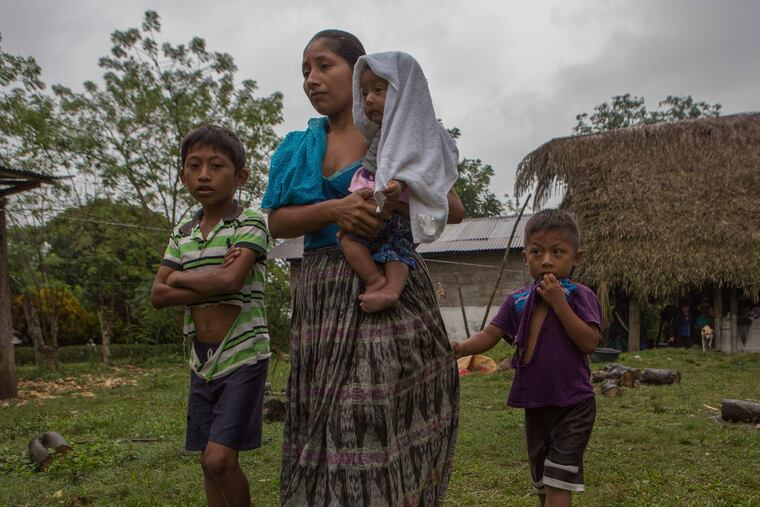Girl who died fled intensely poor Guatemalan village
Jakelin Caal Maquin had received her first pair of shoes several weeks ago, when her father said they would set out together for the United States, thousands of miles from her impoverished Guatemalan village

SAN ANTONIO SECORTEZ, Guatemala (AP) — Jakelin Amei Rosmery Caal Maquin received her first pair of shoes several weeks ago, when her father said they would set out together for the United States, thousands of miles from this small indigenous community in Guatemala where she spent her days plodding through mud and surrounded by coconut trees.
The 7-year-old was excited about the possibility of a new life in another country, relatives said Saturday. Maybe she would get her first toy, or learn to read and write.
Instead she died in a Texas hospital two days after being taken into custody by U.S. Border Patrol agents in a remote stretch of New Mexico desert.
The death has drawn attention to the increasingly perilous routes that Central American migrants traverse to reach the U.S., where some plan to apply for asylum, and to the way migrants are treated once in custody. Jakelin's family says her father paid a human smuggler to sneak them across the border; asylum wasn't the plan.
Sadness hangs in the air outside the tiny wooden house with a straw roof, dirt floors, a few bedsheets and a fire pit for cooking where Jakelin used to sleep with her parents and three siblings. The brothers are barefoot, their feet caked with mud and their clothes in tatters. A heart constructed out of wood and wrapped in plastic announces Jakelin's death.
Grandfather Domingo Caal said the family got by on $5 a day earned harvesting corn and beans. But it wasn't enough. Jakelin's father Nery Caal decided to migrate with his favorite child to earn money he could send back home. Nery often took his daughter to fish at a nearby river. The long journey north would be an even greater adventure.
The girl leapt with joy when she was told about the trip, Domingo Caal said in Spanish.
The people of San Antonio Secortez, a lush mountain hamlet with 420 inhabitants, speak the Mayan Q'eqchi' language, though most of the men also know Spanish.
Domingo Caal translated for Claudia Maquin as she attempted to describe her daughter's life while holding back tears. Jakelin liked to climb trees, Claudia said, but she gives few details.
"Every time they ask me what happened to the girl, it hurts me again," Maquin said.
Members of 13 families from San Antonio Secortez have established homes in the U.S., and community members set off firecrackers to celebrate each time word arrived that one of the townsfolk had made it. The Caals said they believed that Jakelin and Nery would make it, too.
"He was desperate," Domingo Caal said, explaining that his son borrowed money — using his plot of land as guarantee — to pay for the voyage.
The girl and her father, 29-year-old Nery Gilberto Caal Cuz, were arrested with a large group of migrants near the Antelope Wells border crossing at about 9:15 p.m. on Dec. 6 in a dry, rugged area is flecked with ghost towns and abandoned buildings.
U.S. Customs and Border Protection said Friday that the girl initially appeared healthy and that an interview raised no signs of distress. Authorities said her father spoke in Spanish to border agents and signed a form indicating she was in good health.
Jakelin's death drew immediate questions from members of Congress and others about whether more could have been done. There were only four agents working with a group of 163 migrants, including 50 unaccompanied children, and only one bus to take them to the nearest station 94 miles away. The Homeland Security Department's inspector general has opened an investigation.
That single bus set out on a several-hour trip to the Border Patrol station filled with unaccompanied minors — following protocol — while the daughter and her father waited for it to return.
Once on the bus, about eight hours after having been apprehended, Jakelin began vomiting. Officials said agents radioed ahead to have emergency medical technicians available in Lordsburg. When they arrived, 90 minutes later, she had stopped breathing. Emergency crews revived her, and she was airlifted to an El Paso, Texas, hospital, to which the father was driven.
The girl died at about 12:30 a.m. Dec. 8, roughly 19 hours after she began throwing up on the bus and 27 hours after being apprehended. Officials said she had swelling on her brain and liver failure. An autopsy was scheduled to determine the cause of death. The results could take weeks.